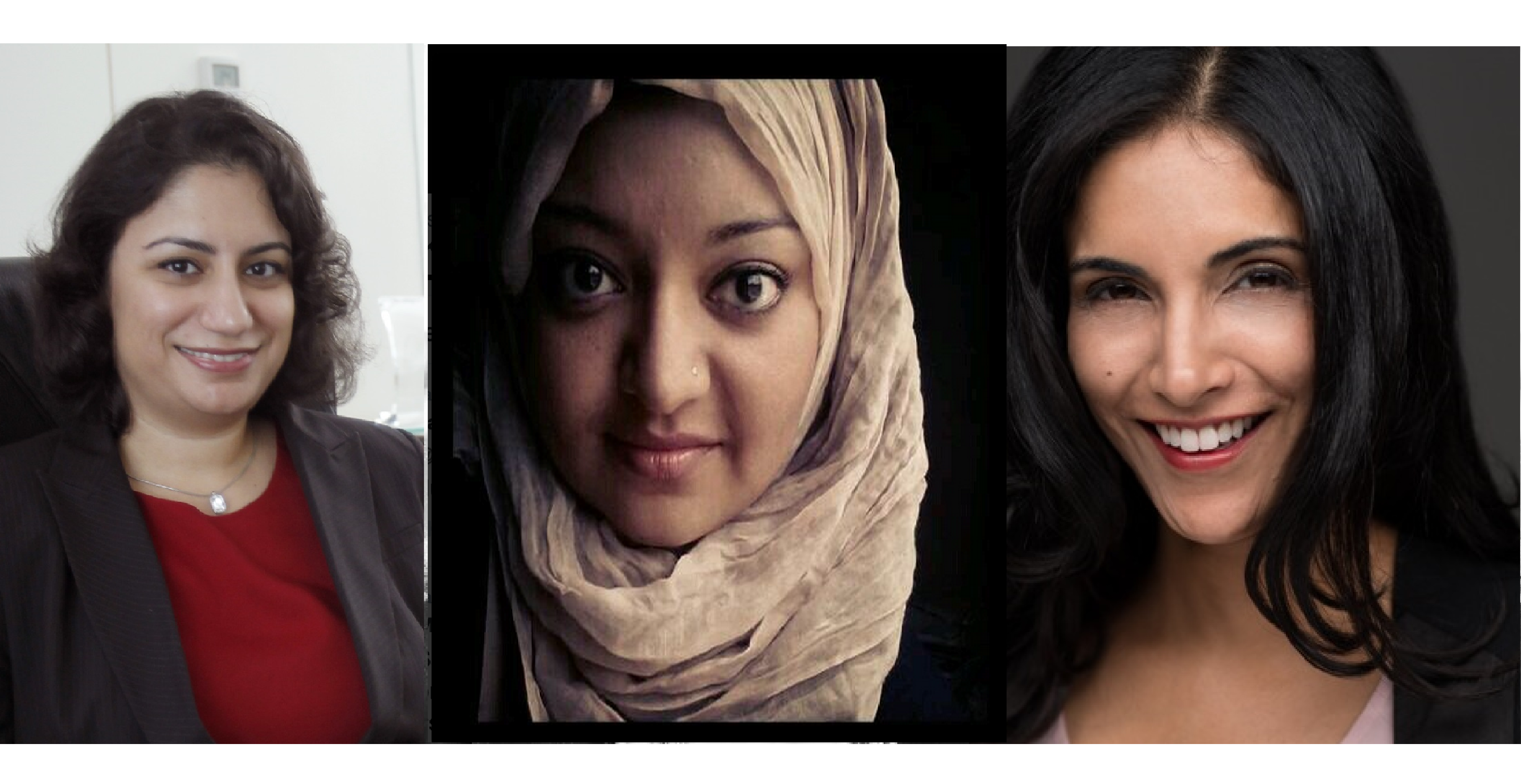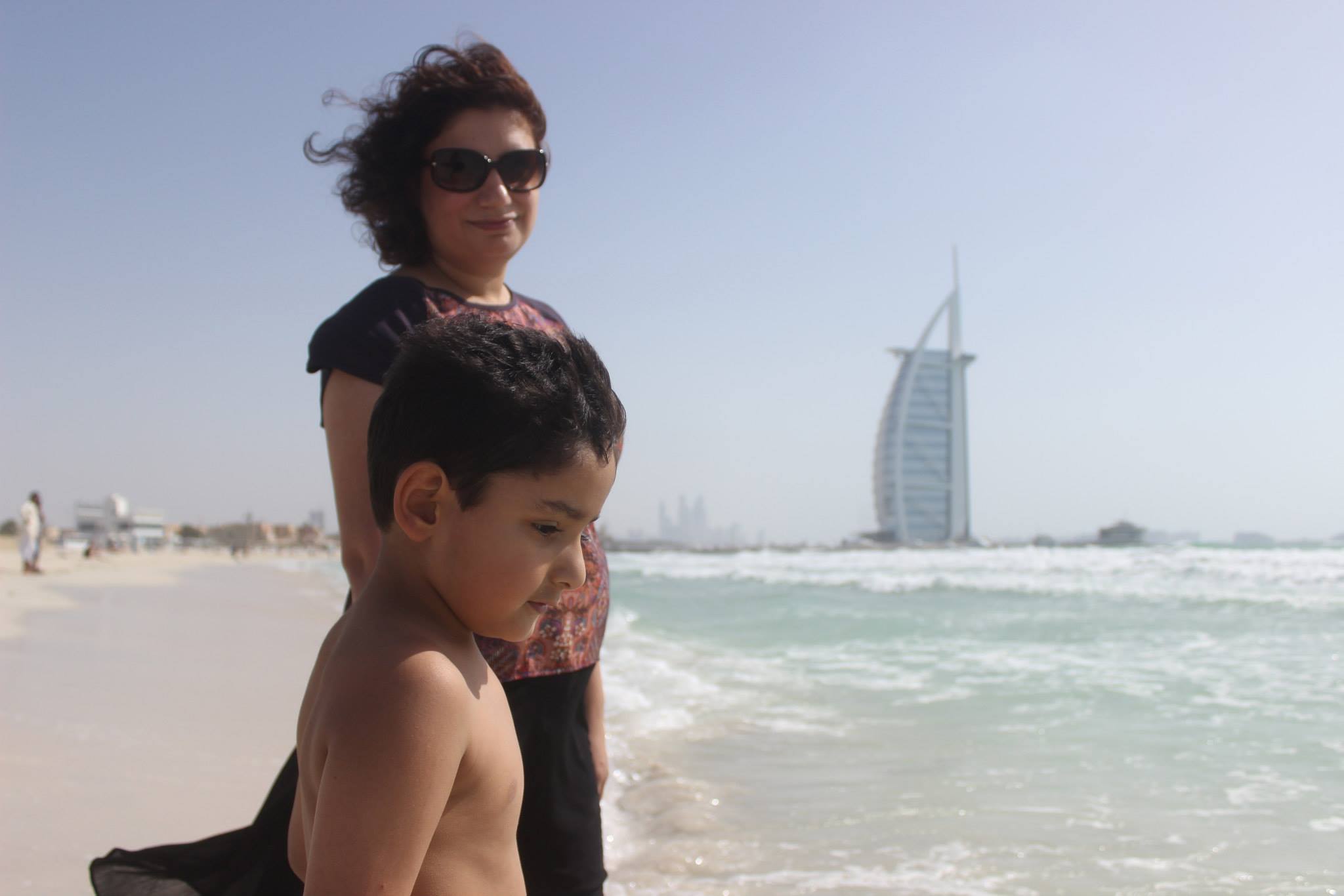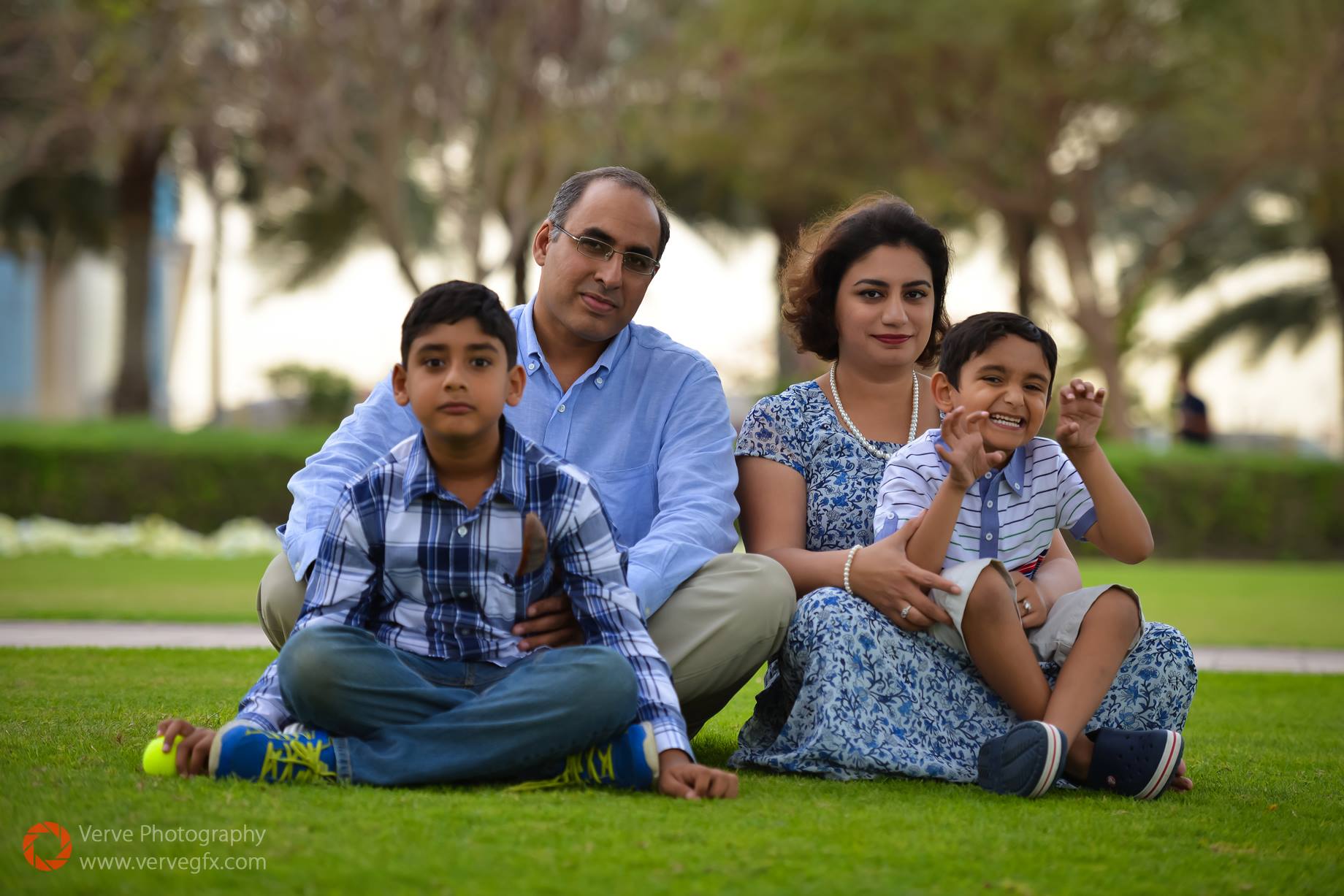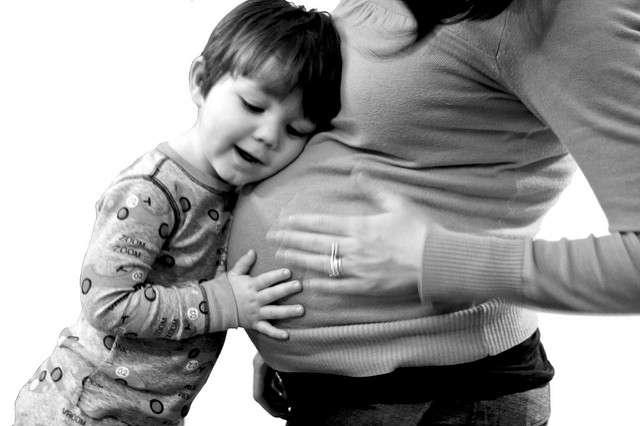[columns_row width=”third”]
[column]
Mariam Ahmed
is a regulatory lawyer. Raised in the U.S, Mariam moved from a law firm in the U.S. to work at a futures exchange in Dubai, where she is currently the Head of Compliance & Risk. Mariam and her husband, Haroon, have two little boys, Hamza (8) and Maaz (4).[/column]
[column]
Rabia Chaudry
is an attorney and International Security Fellow at the New America Foundation. She is the co-host of the podcast “Undisclosed” and long-time advocate of Adnan Syed, the subject of the podcast “Serial”. She is a frequent public speaker and writer on issues related to Islam, Muslims, civil rights, violent extremism, and gender.
[/column]
[column]
Samar Kaukab
is the Executive Director of Arete, a multi-unit research strategy team at the University of Chicago. In this role, Samar works with faculty and University leadership to launch complex research initiatives. Samar also works on anti-sexual violence advocacy and is mother to three children and two step-children.
[/column]
[/columns_row]
Mariam: Through all the ups and downs I’ve gone through in my attempts to manage a career as a lawyer with a life as a mother, the one thing that’s always bolstered me up is my support system. And most especially my husband. I do often wonder though, when he is unavailable for one reason or another and I’m panicking to manage on my own, how single moms do this. I have so much admiration for women who manage careers and children as single moms.
So let me start by asking both of you: what were your perceptions of single moms before you became single moms yourselves?
Rabia: To be honest, I never gave single mothers much thought because there were none in my social circle and though I wanted to leave my marriage, I wasn’t able to really and fully envision myself as a single mom. There was one single working mom in my professional circle and I admit I felt a bit sad and sorry for her, which I’m embarrassed about in retrospect. She did have to fend off a lot of advances in the office too, which is reprehensible.
Samar: Having had a few close friends and work colleagues who were single mothers over the years, I think I’ve had some awareness of the unique challenges that single mothers face. Witnessing their struggles in balancing jobs, childcare, finances, managing a household, and social dynamics highlighted the Herculean juggle that single mothers have to stay on top of on a daily basis. Having said that, I very naively never anticipated that I myself would become a single mother. I’m sure there is a certain level of denial involved, or even shame, but I can honestly say that this was a scenario that I often avoided imagining myself occupying.
Mariam: What did you both find to be the hardest thing about becoming a single mom?
Samar: Hands down, I think the single hardest thing in becoming a single mother was managing the exhausting daily hustle. Showing up with enough energy and presence for a 9am meeting after managing the morning routine of getting oneself and the children dressed and mildly presentable, putting breakfast on the table, finding that lost library book, getting everyone to wear their coats, gloves, scarves on despite Occupy Wall Street level protests from the children, clearing the car’s windows from snow, and driving everyone to their various morning destinations — all of this was exhausting before the work day even started.
I know that might sound trite, but add in the mental pressure of knowing how much is riding on your ability to be simultaneously functional as a mother and a high performer at work and the daily routine in and of itself was the biggest boulder I needed to push. The idea that “this is all we’ve got to bank on” is an intense amount of pressure for a person to take on singlehandedly.
Rabia: It’s hard to decide what was more difficult, the logistics of daily life (i.e. time management, finances) or the guilt and sense of failing I carried for not giving my daughter a home with two parents. In some way, the logistical juggling keeps you moving and busy, with less time to think about what is actually more important, which is the emotional health of your child and yourself, too. I know she looked at other children whose parents were together and wanted it so badly. It will always be a place of pain for me that we weren’t able to give it to her.
Mariam: When I think about single working moms I always think that they show us all the biggest reason why it is so important to support women’s careers. Do you wonder what you would have done if you didn’t have professional degrees that allowed you to support yourself and your children?
Samar: Absolutely. I think about that all the time and thank my parents for constantly urging me to pursue a viable career path that could be financially sustainable. “No one ever knows what will come tomorrow” is a maxim I’m glad my family instilled in me early on. There are multiple ways to approach that general principle. The first is to be debilitated by fear and live in denial of it. The second is to allow it to be a motivator. We can’t plan for the things that will happen to us but we can work to be more resilient and prepared. Financial resilience and the ability to earn a living, in particular, is no small thing for a woman, and especially a mother, to possess.
Another way my career was life-saving is that it gave me a reason to get out of my pajamas and use my brain. At a time when I was feeling publicly shamed yet simultaneously invisible, small successes in my daily work life provided me with the confidence boosts that I needed to get the rest of my life back in order. We all need these daily successes to affirm to us that there is positive movement. My career definitely provided that and more for me during my hardest times.
Rabia: Over the years I’ve represented many, many women who had neither the education nor work skills to support themselves, and then found themselves divorced, abused, kicked out of the home. I’ve seen the struggle, the fear, the reliance in others. There is not much more terrifying than not knowing how to support yourself and your children. These women often are at the mercy of others, who shuttle them from one shelter to another.
When I was divorced, the separation came abruptly. I had just graduated from law school, had yet to pass the bar exam, had no savings, no job, nothing to my name other than a car. Even as a law graduate, the struggle was tremendous, but I’m one of the lucky ones. I had my parents’ home to go to, I had finished my education, and had a strong foundation to build on. It took a few years to get my bearings, but without the education, I would have ended up working in low-paying jobs with little hope for upward mobility.
A career is important. But without an education, it is very unlikely to establish one. That’s why, in my book, education is key.
Mariam: Rabia, you have become known across the world because of your advocacy on behalf of Adnan Syed, and the success of Serial. I live in Dubai and I know lots of people here, from many parts of the world, who are following his case because of Serial. What impact has your work had on your family, and particularly on your daughters? What do you think they have learned from seeing you go through this experience?
Rabia: I have two daughters, one who is ready for college, and the other in elementary school. It’s hard for me to gauge the impact on them, maybe because I’m too close to them, maybe because I won’t see the impact until they’re grown.
I hope what they learn from me is that education and hard work can open the world to you, and that there are things worth fighting for with everything you’ve got.
As with the case of any working mom and wife, your family will be impacted, they will have to sacrifice, they will not be able to get 100% of your attention 100% of the time, and we have to get to a point where society is ok with that. Mothers shouldn’t be required to stop being their own people, to shed their personalities and interests and passions, any more than fathers are.
If you reduce the mother in your family to a service machine, you’re killing her soul and depriving her of living the one life she has. We all get one shot at this, moms should get their shot too.
Mariam: Samar, you’ve previously written about some of the issues your family has faced in the past few years (link). What lessons do you hope your children learn from seeing you go through this experience?
Samar: As a mother, I really thought long and hard before I shared anything about the issues my family has faced in the past several years. Ours had otherwise been a very public ordeal that was covered internationally and quite heavily in the Chicago media.
My decision to begin to write about my experiences was largely based on preserving my own sense of self in the midst of all of this chaos. Writing provided me with something to grasp at as I struggled to make sense of all that had happened. I hope this continual process of healing and connecting with others allows me to become an even better and healthier mother.
As for my children, I want for them to know that their stories are their own regardless of what is or is not already out there in the media or anywhere else. Despite the fact that this part of their life was highly publicized and analyzed in various social circles, I want for them to know that we are each given the capacity to frame our own narratives.
I also want them to know that there is no shame in embracing truth. Struggle is both full of light and darkness and I want for them to learn that there is beauty to be found in the decision making process itself. There is so much fascinating discovery to be made while one is navigating through tough times – about oneself, about others, about identity, about God and the worlds we live in. Most of all, I hope my children learn that they must seek out and hang on to any sources of light in the midst of darkness.
Mariam: What do you think about the general level of support for single working moms in our community?
Samar: If I can be perfectly frank, I think it is severely lacking. I don’t think many in our communities know how to effectively support single mothers. On a broad societal level, the issues this nation faces as it relates to childcare and job security for single parents is an absolute shame. On a more micro-community level, I think the Muslim communities that I belong to often didn’t know what to do or didn’t think to support single, working mothers.
For instance, this is something small but very quickly the invitations for playdates, dinners, iftars, and the spontaneous drop-ins almost completely disappeared from my plate just when my children and I needed them most. I’m sure that this was not malintentioned. Perhaps many in the community felt a great deal of discomfort or uncertainty and felt it was easier to leave us alone. However, from the very macro level to the micro, I think our communities are severely lacking in terms of providing substantive supports to single, working mothers.
One easy example of what one could do to be supportive to a single, working mother is to offer to help her figure out options for emergency childcare for when there are sick children, snow days, or when the children have days off from school. It would be wonderful to offer to host her children for a play date during those days off from school or split the cost of a babysitter to watch children in both families.
Additionally, just because she does not have a partner does not mean you should drop her from the existing social circuit. In fact, more than ever, a single working mother likely craves the company of other adults and wants to attend events where she is welcome to bring her children. One of the things I feared most for my own children once I became a single mother was their exclusion from the sense of “community” they once had when I was married. I was often too exhausted to plan or organize social events for myself or my children, but very much appreciated when others included us in their family plans during non-work hours.
Rabia: We are light years away from consciously developing support systems (or even thinking collectively about) single moms. At this point we still haven’t developed proper support for people in bad marriages or going through divorces and I’m also highly skeptical that the needs of women (single or otherwise) register on the community level or will anytime in the near future. Heck we are still trying to be able to pray without facing a wall or in a basement. Generally speaking, the issues faced by women are only taken up by other women.
Maybe when we can get beyond the taboo of divorce and single parenthood, we can actually get to the work of developing support for single mothers. I have always been open about being divorced, a single mom, and then remarried, mostly to challenge the idea that there was anything wrong with it. I never hid any of it, would let new acquaintances know, and wrote about it. The response was kind of sad, I got so many messages of “thank you, no one writes about this, no one talks about this, I’ve been all alone in my struggle.” It made me realize that the cultural shame and stigma prevented women from even sharing that they were single mothers, much less asking for help.
Mariam: Do you find that the perceptions of and support for single moms is changing in the community?
Samar: On a good day, I think that awareness surrounding single mothers and the issues they face may be very slowly dawning within our communities. Unfortunately, we’ve always had a dearth of single Muslim mothers within the broader Muslim community and it’s not as if this is a new or growing issue by any means.
However, with more women writing, speaking, and rising up to lead organizations, I am hopeful that the invisibility of single mothers within our communities and the particular issues that they face will become less so. I hope that community organizations, centers, and mosques begin to realize that this current gap is also an important opportunity in building relevancy by advocating for and developing policies that encourage community-wide — dare I say it, even systematic — support for single parents.





